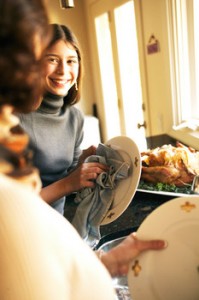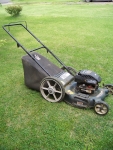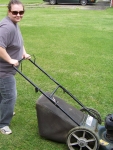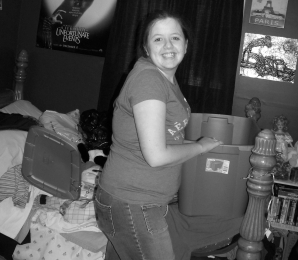 How many gifts do you think you’ll receive this Christmas? A dozen? Two dozen? More? Although receiving gifts is not what this season should be about, it is sad to think about the many children who will not get to experience the innocent, pure joy of finding gifts under the tree on Christmas morning. I’m sure that most of us have never had to wake up to a room void of gifts on this most memorable of mornings. We often don’t even have to worry about not getting that most coveted gift we’ve been thinking about for months—it’s usually there, waiting for us. But do we ever pause to think about the quiet disappointment that fills so many houses every Christmas? Not the disappointment of not finding that treasured gift among the other twenty, but of not even expecting a single gift at all.
How many gifts do you think you’ll receive this Christmas? A dozen? Two dozen? More? Although receiving gifts is not what this season should be about, it is sad to think about the many children who will not get to experience the innocent, pure joy of finding gifts under the tree on Christmas morning. I’m sure that most of us have never had to wake up to a room void of gifts on this most memorable of mornings. We often don’t even have to worry about not getting that most coveted gift we’ve been thinking about for months—it’s usually there, waiting for us. But do we ever pause to think about the quiet disappointment that fills so many houses every Christmas? Not the disappointment of not finding that treasured gift among the other twenty, but of not even expecting a single gift at all.
Now is your chance to help a child get to experience the joy of Christmas morning that so many of us have always taken for granted. I’m sure many of you have seen Angel Trees placed in stores and schools in your area. These trees lend a wonderful opportunity to meet this childhood desire of someone who would otherwise not experience it. The process is fairly easy, but the unseen rewards are priceless.
Begin by locating a place that offers an Angel Tree. You can often find these at banks, grocery stores, and schools. These trees are decorated with paper angels, which have information about a specific child on the back. The information will include the age and gender of the child, so select an angel you feel you would be prepared to shop for. Ask someone in charge of the tree when the gifts should be returned, how they should be packaged (most prefer them to be left unwrapped), and where they should be returned (usually back to the same location). And then . . . let the fun begin! Designate an amount of money that you want to spend on this child (2 Corinthians 9:7). You may choose to do this as a family project, with a friend, or you may allot some of your income to this project. Remember that you will be the primary gift giver for this child, so consider that when you’re out shopping. Most angels will have a short list of “want” and “need” items for the child, along with sizes for clothing and shoes. In the past, I’ve tried to evenly apportion my attention and money to both the fun “want” items and the important “need” items for the angel I’ve chosen.
 When you are finished shopping, package the items however the sponsor wishes, and, most importantly, return them with your angel paper back to the appropriate location on time. If you toss or lose the angel paper in the process of shopping, there will be no way for the sponsor to locate which child you’ve shopped for (although they do often write down your name and the angel’s ID number when you select it).
When you are finished shopping, package the items however the sponsor wishes, and, most importantly, return them with your angel paper back to the appropriate location on time. If you toss or lose the angel paper in the process of shopping, there will be no way for the sponsor to locate which child you’ve shopped for (although they do often write down your name and the angel’s ID number when you select it).
And now it’s time to sit back and enjoy the thoughts of a less fortunate child getting to experience the joy of discovering unexpected and thoughtful gifts on such a memorable morning—and a parent who can delight in his or her child’s simple happiness, provided by a giving stranger.
Lisa Grimenstein
 We’ve made it to November, ladies! We get to fall off the wagon and eat lots of delicious delicacies. There
We’ve made it to November, ladies! We get to fall off the wagon and eat lots of delicious delicacies. There Surprise your parents by washing and drying your uniform for work (if you have a job and a uniform). You could also Windex the glass things in your house (TVs, computer screens, and mirrors), or dust all the surfaces. You could pick up around the house and/or even pick up (or even completely clean) your room. If you feel that all the things you’re doing around the house will only benefit your mother, then find some things to do to help your dad (if weather permits), like cutting the grass one more time before the cold weather sets in, or raking the leaves in your yard so that your dad doesn’t have to.
Surprise your parents by washing and drying your uniform for work (if you have a job and a uniform). You could also Windex the glass things in your house (TVs, computer screens, and mirrors), or dust all the surfaces. You could pick up around the house and/or even pick up (or even completely clean) your room. If you feel that all the things you’re doing around the house will only benefit your mother, then find some things to do to help your dad (if weather permits), like cutting the grass one more time before the cold weather sets in, or raking the leaves in your yard so that your dad doesn’t have to. It’s now October. We’re far enough into the school year to know our routines pretty well and we can juggle more stuff that comes up. Autumn is just starting—it’s getting chillier and the leaves are starting to change colors. This month’s project is to “adopt” a young girl from your congregation and encourage her to be virtuous.
It’s now October. We’re far enough into the school year to know our routines pretty well and we can juggle more stuff that comes up. Autumn is just starting—it’s getting chillier and the leaves are starting to change colors. This month’s project is to “adopt” a young girl from your congregation and encourage her to be virtuous. By encouraging the younger generation, we’re helping to ensure the church’s future. The younger people (that are now kids to us) are the ones that are going to be responsible for spreading the gospel in the future. Their actions and how we encourage them to be godly will influence their decisions for the rest of their lives. We’re going to be the older, wiser people of the church that will be there for the younger ones even as we age. We all should be striving to the goal and challenge of keeping the church alive and interesting in the hearts of the younger people. Think of where we would be if someone hadn’t talked to us about Christ and showed us the true Light. Let’s encourage others to remain steadfast in being virtuous young women, just as someone else has encouraged us.
By encouraging the younger generation, we’re helping to ensure the church’s future. The younger people (that are now kids to us) are the ones that are going to be responsible for spreading the gospel in the future. Their actions and how we encourage them to be godly will influence their decisions for the rest of their lives. We’re going to be the older, wiser people of the church that will be there for the younger ones even as we age. We all should be striving to the goal and challenge of keeping the church alive and interesting in the hearts of the younger people. Think of where we would be if someone hadn’t talked to us about Christ and showed us the true Light. Let’s encourage others to remain steadfast in being virtuous young women, just as someone else has encouraged us. Now that school is back and we’re back into the routines that we love, many of you are probably thinking of two things: homework and tests. You’re not the only one, believe me. However, we have to remember to encourage others, as well as ourselves, every chance we get! This month’s idea is to find someone in your congregation who has trouble seeing and help them read (or read to them if their eyesight is too bad) their favorite passage or Bible verses. In this project, you will not only be improving their minds, you would be improving your knowledge of the Bible as well.
Now that school is back and we’re back into the routines that we love, many of you are probably thinking of two things: homework and tests. You’re not the only one, believe me. However, we have to remember to encourage others, as well as ourselves, every chance we get! This month’s idea is to find someone in your congregation who has trouble seeing and help them read (or read to them if their eyesight is too bad) their favorite passage or Bible verses. In this project, you will not only be improving their minds, you would be improving your knowledge of the Bible as well. I learned a lot from Clyde just from him allowing me to read to him. I learned about his passion for God and God’s word, what a faithful Christian he is, and that he’s a wonderful influence for me on how to stay faithful and how to motivate myself to learn more about God’s word. I don’t think that many of the teenage ladies understand just how much knowledge the older members of the church have, both in regard to the Christian life and life in general. We must always be willing to spread God’s word––not just once in a while. We should always be striving to get His word out to non-Christians. We will be mocked and our feelings will get hurt, but we will be leaving a wonderful legacy and our words could influence someone to search the scriptures and learn God’s word. And through all the mocking, the tears, and the anger, if we help influence someone we love to become a Christian and want to live faithfully for God, then it’s all worth it.
I learned a lot from Clyde just from him allowing me to read to him. I learned about his passion for God and God’s word, what a faithful Christian he is, and that he’s a wonderful influence for me on how to stay faithful and how to motivate myself to learn more about God’s word. I don’t think that many of the teenage ladies understand just how much knowledge the older members of the church have, both in regard to the Christian life and life in general. We must always be willing to spread God’s word––not just once in a while. We should always be striving to get His word out to non-Christians. We will be mocked and our feelings will get hurt, but we will be leaving a wonderful legacy and our words could influence someone to search the scriptures and learn God’s word. And through all the mocking, the tears, and the anger, if we help influence someone we love to become a Christian and want to live faithfully for God, then it’s all worth it. It’s time for school to start again. No more time for sleeping in and having all day to procrastinate on projects. We will begin to focus much of our minds on getting supplies, finishing up our summer work, and getting new clothes (which really isn’t bad…). We’ll be overtaken with getting everything ready, eventually starting school, and doing the homework from the early “starting” days of school that our teachers will probably give to us.
It’s time for school to start again. No more time for sleeping in and having all day to procrastinate on projects. We will begin to focus much of our minds on getting supplies, finishing up our summer work, and getting new clothes (which really isn’t bad…). We’ll be overtaken with getting everything ready, eventually starting school, and doing the homework from the early “starting” days of school that our teachers will probably give to us. I went to the Dollar General store and got a girl’s backpack (they only had girls’, no neutral), thirty eraser caps, twelve colored pencils, six mechanical pencils, a portable pencil sharpener, two folders, and glue. The most expensive thing I bought was the backpack. I spent about $9 total on this project. That’s pretty good, especially considering how much we tend to spend on our own school supplies. I also looked around my house for things that I knew I would never use. For example, unsharpened wooden pencils. If you have any loose-leaf paper at home, you can take that too. I took the supplies to the local primary school and said that I’d like to donate the backpack and everything in it to the school to be given to a child who needed it. You might want to call a school in your area and ask them if they accept donations.
I went to the Dollar General store and got a girl’s backpack (they only had girls’, no neutral), thirty eraser caps, twelve colored pencils, six mechanical pencils, a portable pencil sharpener, two folders, and glue. The most expensive thing I bought was the backpack. I spent about $9 total on this project. That’s pretty good, especially considering how much we tend to spend on our own school supplies. I also looked around my house for things that I knew I would never use. For example, unsharpened wooden pencils. If you have any loose-leaf paper at home, you can take that too. I took the supplies to the local primary school and said that I’d like to donate the backpack and everything in it to the school to be given to a child who needed it. You might want to call a school in your area and ask them if they accept donations. According to Matthew 6:3-4, we are commanded to give to the poor, without announcing to everyone what we are doing. “But when you give to the poor, do not let your left hand know what your right hand is doing, so that your giving will be in secret; and your Father who sees what is done in secret will reward you.” We can help others more than we know. We need to consider others to be as important as ourselves. God has given us time, and we need to give some of that back to Him, and use that time to show others who He is.
According to Matthew 6:3-4, we are commanded to give to the poor, without announcing to everyone what we are doing. “But when you give to the poor, do not let your left hand know what your right hand is doing, so that your giving will be in secret; and your Father who sees what is done in secret will reward you.” We can help others more than we know. We need to consider others to be as important as ourselves. God has given us time, and we need to give some of that back to Him, and use that time to show others who He is. Summer is here! The temperature is rising and the sun is shining brighter than ever. Now is the time for pulling weeds, mowing grass, and planting flowers. Summer work is some of the most challenging work to be done. There is a lot of strenuous activity that goes into yard work. But for now, mowing grass is the topic. Not all girls know how to cut grass, or even how to start the mower. That’s okay, really it is. Hopefully this article will help you in this area—not only to do the work, but also to keep from hurting yourself in the process.
Summer is here! The temperature is rising and the sun is shining brighter than ever. Now is the time for pulling weeds, mowing grass, and planting flowers. Summer work is some of the most challenging work to be done. There is a lot of strenuous activity that goes into yard work. But for now, mowing grass is the topic. Not all girls know how to cut grass, or even how to start the mower. That’s okay, really it is. Hopefully this article will help you in this area—not only to do the work, but also to keep from hurting yourself in the process. For push mowers, hold down the bar at the handle of the mower, pull the “pull start” (yes, that’s what it’s called, and it’s the cord to the right of the handlebar) hard and fast. Don’t pull the cord out; just pull hard and fast enough to start it. Pull it two or three times. If the mower still doesn’t start, go to the right (or left) side of your mower—there will be a red button that says “prime.” Push it two or three times, then hold the bar down and try to start the mower again. If you can do that, you’re pretty much good to go.
For push mowers, hold down the bar at the handle of the mower, pull the “pull start” (yes, that’s what it’s called, and it’s the cord to the right of the handlebar) hard and fast. Don’t pull the cord out; just pull hard and fast enough to start it. Pull it two or three times. If the mower still doesn’t start, go to the right (or left) side of your mower—there will be a red button that says “prime.” Push it two or three times, then hold the bar down and try to start the mower again. If you can do that, you’re pretty much good to go. That’s about it. It’s not an easy job, or one that you can put off for too long (or else the grass will get thicker, causing people with bag mowers to empty a lot more often), but it’s a good job that helps build arm and leg muscles (believe me!). Perhaps most importantly, it’s also something simple enough to do for someone who’s lost, or a sick shut-in. You’d be amazed at how something as simple as cutting someone’s grass will mean to them.
That’s about it. It’s not an easy job, or one that you can put off for too long (or else the grass will get thicker, causing people with bag mowers to empty a lot more often), but it’s a good job that helps build arm and leg muscles (believe me!). Perhaps most importantly, it’s also something simple enough to do for someone who’s lost, or a sick shut-in. You’d be amazed at how something as simple as cutting someone’s grass will mean to them.
 Many Christians would love to start helping other people who aren’t able to do certain things. However, many don’t know where to start, or are too shy, and they often ask, “How do I start?” or “What if I can’t afford it?” There is one place we can begin. We can start by encouraging our shut-ins and the sick in our congregations. We can let them know that we’re there for them, that we miss them, and that we can’t wait to see them worshiping with us again.
Many Christians would love to start helping other people who aren’t able to do certain things. However, many don’t know where to start, or are too shy, and they often ask, “How do I start?” or “What if I can’t afford it?” There is one place we can begin. We can start by encouraging our shut-ins and the sick in our congregations. We can let them know that we’re there for them, that we miss them, and that we can’t wait to see them worshiping with us again. Our first project—and a great way to kick off the summer—is cleaning out one of our closets. Since I (Alyssa) came up with this idea, we cleaned out mine—and what an adventure it was! It was like Christmas! We found things of mine that I forgot I had!
Our first project—and a great way to kick off the summer—is cleaning out one of our closets. Since I (Alyssa) came up with this idea, we cleaned out mine—and what an adventure it was! It was like Christmas! We found things of mine that I forgot I had!
Recent Comments